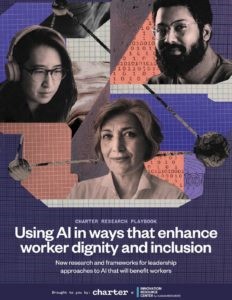About this IRC® + IRC4HR® Project
Technological innovation and automation have always produced major transformations in the nature and experience of work. And the resulting disruptions have benefited some groups and disadvantaged others.
So, it is no surprise that amid the great promise of using generative AI in workplaces — where the nature of most modern jobs will change significantly — there are groups of workers who are least likely to benefit.
As the authors of this study have previously written , “Research suggests that women and workers of color could be disproportionately disadvantaged by the broader use of AI and automation. But it doesn’t necessarily have to be that way.”
The outcomes of technology are not predetermined.
There are always choices to be made about how it is used and how it is deployed.
In their just-released study – Using AI in ways that enhance worker dignity and inclusion – the research team from Charter authored a “playbook” for workers, HR practitioners, policy-makers, and all leaders to help them make decisions that will support a just transition to AI in the workplace.
This original qualitative and quantitative research project is based on data and insights from a survey of 1,173 workers across the US that took place from August 6 to August 26, 2023. It also includes guidance from practitioners, labor economists, research scientists, and labor organizers about what’s known and unknown about AI in modern workplaces, including lessons from past technological transformations. It seeks to better understand the attitudes, concerns, and desires across groups of workers around the adoption of AI tools in their workplaces so they can be included in decisions about AI use and deployment.
With this research playbook, the authors — and IRC4HR — intend to inform the choices that will be made in ways that will enhance the success that employers and workers experience as they navigate the increasing presence of AI in their workplaces.
The playbook is filled with valuable frameworks and practical recommendations for how to foster human-centered AI adoption in your workplace.
We are excited about this important research and confident that you will find the findings and playbook insightful and practical. Please find a link below where you can open and download the playbook.
To stay informed about this and other studies funded by IRC4HR, please share your name and email address.
Researchers

Kevin Delaney is the co-Founder, CEO, and Editor-in-Chief of Charter Works, Inc., an organization with a mission “to transform every workplace and catalyze a new era of dynamic organizations where all workers thrive. Charter does this by bridging research to practice – giving people the tactical playbook for what work can and should be.”
Kevin previously was managing editor at The Wall Street Journal, senior editor at The New York Times, and The Information, and founding editor-in-chief and co-CEO of Quartz. He has a History degree from Yale University, is a member of the Council on Foreign Relations, is a board member of the Internews journalism non-profit, and was the Hearst digital media professional-in-residence at Columbia University.

Emily Goligoski is the Head of Research at Charter Works, Inc. She previously directed audience research at The Atlantic, served as research director for the Membership Puzzle Project at New York University, and led user experience research for The New York Times newsroom. She holds a Master’s Degree in Learning, Design, and Technology from Stanford and is an adjunct professor at Columbia Graduate School of Journalism.

Jacob is a reporter at Charter Pro, primarily covering AI in the workplace. Prior to Charter, Jacob was a researcher at the Freakonomics Radio Network, and a research assistant for historian Chris Miller, author of Chip War, and business school professor Michael Porter.
IRC® + IRC4HR® Project Publications and Learning Materials
Using AI in ways that enhance worker dignity and inclusion

IRC® + IRC4HR® Upcoming Webinars and Studies
Coming soon. Please check back later.
